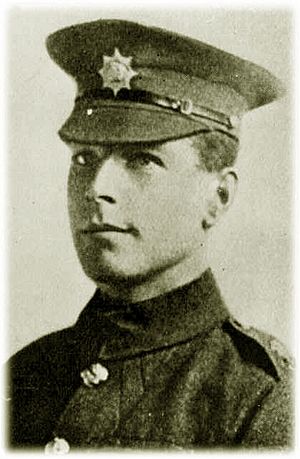Thomas Norman Jackson facts for kids
Quick facts for kids
Thomas Norman Jackson
VC
|
|
|---|---|
 |
|
| Born | 11 February 1897 Swinton, West Riding of Yorkshire, England |
| Died | 27 September 1918 (aged 21) † Canal du Nord, France |
| Buried |
Sanders Keep Military Cemetery, Graincourt-les-Havrincourt
|
| Allegiance | |
| Service/ |
|
| Years of service | 1915–1918 |
| Rank | Lance Corporal |
| Unit | Coldstream Guards |
| Battles/wars | World War I |
| Awards | |
Thomas Norman Jackson (born February 11, 1897 – died September 27, 1918) was a brave English soldier. He fought in the First World War as part of the British Army. He was given the Victoria Cross (VC) after he died. The Victoria Cross is the highest award for bravery a soldier can receive in the United Kingdom and Commonwealth countries.
Contents
Early Life of Thomas Jackson
Thomas Norman Jackson was born on February 11, 1897. His hometown was Swinton, which was in West Riding of Yorkshire back then. His father, Thomas Edwin Jackson, worked for a company that supplied mineral water. Thomas followed in his father's footsteps for a while. Later, he got a job at the Great Central Locomotive Depot in Mexborough.
Serving in the First World War
In November 1915, Thomas Jackson joined the British Army. In October 1917, he was sent to France. He joined the 1st Battalion of the Coldstream Guards. This group was fighting on the Western Front. He took part in the Battle of Cambrai the next month. Later, he was promoted to lance corporal, which is a junior leader rank.
Bravery at the Canal du Nord
On September 27, 1918, the Coldstream Guards were fighting near Graincourt. This was during a big attack called the Hundred Days Offensive. Jackson's group had a very important job. They needed to capture a crossing over the Canal du Nord. After crossing, they were to set up defenses.
When Jackson's company reached the canal, they faced a big problem. There was barbed wire and heavy machine-gun fire. The German machine gun was hidden under the bridge on the other side. Jackson, along with his officer, Captain Cyril Frisby, and two other soldiers, bravely went through the wire. They climbed down into the canal, even with all the gunfire. Twelve more soldiers joined them. Together, they managed to capture the German machine-gun post. This allowed their whole company to move forward.
Jackson's Final Act of Courage
Later that morning, Jackson was given another order. He and his small group were to capture a German trench. Jackson was the first one to jump into the trench. He fought two German soldiers. Sadly, he was killed during this brave action.
His grave is at Sanders Keep Military Cemetery. This cemetery is near Graincourt-les-Havrincourt, west of Cambrai.
Receiving the Victoria Cross
Thomas Jackson was awarded the Victoria Cross for his actions on September 27, 1918. He was one of seven soldiers to receive this award for bravery that day. The official statement about his award said:
For most conspicuous bravery and self-sacrifice in the attack across the Canal Du Nord, near Graincourt. On the morning of the 27th September, 1918, L./Cpl. Jackson was the first to volunteer to follow Capt. C. H. Frisby, Coldstream Guards, across the Canal du Nord in his rush against an enemy machine-gun post. With two comrades he followed his officer across the Canal, rushed the post, captured the two machine-guns, and so enabled the companies to advance. Later in the morning, L./Cpl. Jackson was the first to jump into a German trench which his platoon had to clear, and after doing further excellent work he was unfortunately killed. Throughout the whole day until he was killed this young N.C.O. showed the greatest valour and devotion to duty and set an inspiring example to all.
—London Gazette, 27 November 1918
On March 29, 1919, King George V presented Jackson's Victoria Cross to his parents. The ceremony took place at Buckingham Palace. Jackson's fiancée, Daisy Flatt, was also there. Captain Frisby, who was also receiving his own Victoria Cross that day, explained to Jackson's family exactly what happened. A few months later, Captain Frisby visited Swinton. He helped unveil a painting that honored Thomas Jackson.
Thomas Jackson's Medals
In June 1969, Thomas Jackson's brother donated his medals. Besides the Victoria Cross, these included the British War Medal and the Victory Medal. These medals are now on display. You can see them at The Coldstream Guards Regimental Headquarters. This is located at Wellington Barracks in London.
 | Selma Burke |
 | Pauline Powell Burns |
 | Frederick J. Brown |
 | Robert Blackburn |

